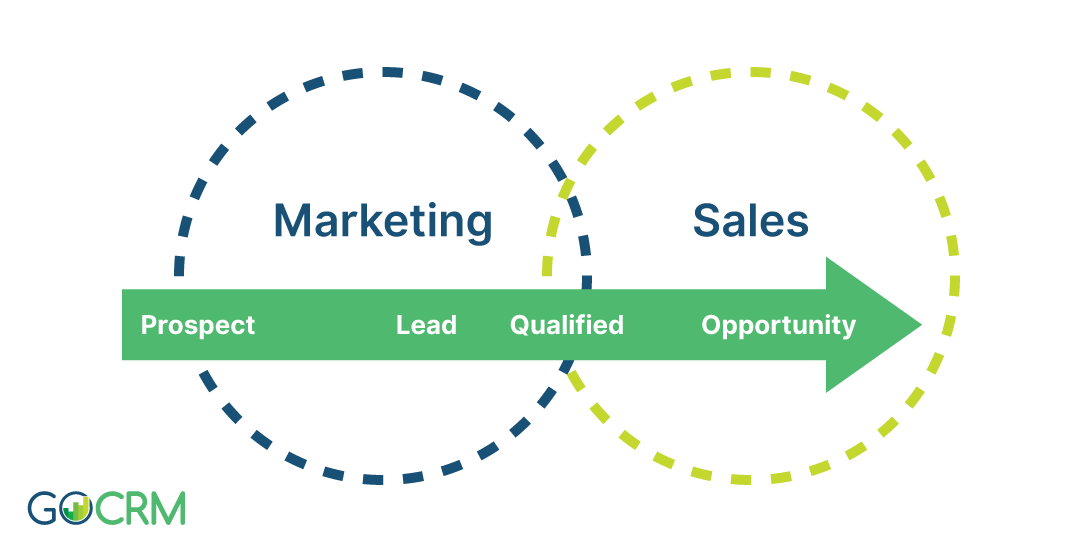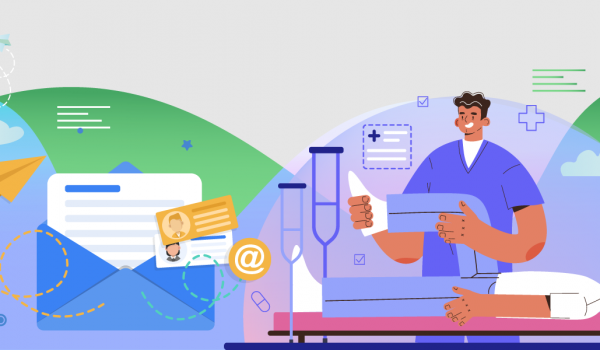
Customer relationship management (CRM) has long been considered the purview of a company’s sales team. Marketing delivers the leads, but it is the sales team’s responsibility to nurture those leads through the sales funnel.
Not anymore. With CRM software rapidly advancing in its features, capabilities, and customization options, it is now as much a tool for marketing as it is for sales. In fact, when businesses use CRM software to merge the efforts of marketing and sales, they create a powerhouse of customer conversion.

CRM marketing strategy focuses on a number of specific areas where the CRM’s functionality can inform, automate, and improve the marketing field.
Lead Targeting
The importance of CRM in marketing begins with identifying the best audiences to target with specific marketing efforts. CRM software also allows marketers to identify and target the most profitable prospects, as well as qualify leads before handing them over to sales.
CRM software accomplishes this task by pulling in information about potential prospects from every possible source. GoCRM, for example, can pull data from hundreds of sources in order to create a complete picture of every prospect. This data is placed in one central location for easy access by marketers and sales teams alike.
Marketers can identify the audiences that make the most purchases, deliver the most revenue to the business, respond the most to certain marketing tactics, and more. Armed with this information, they can deliver targeted marketing that maximizes revenue and profits.
Lead Qualification
Without the right CRM marketing initiative, businesses have two options: Send every lead to the sales team or spend many hours manually qualifying leads before handing them over to sales. The first option overwhelms sales with leads that may or may not be ready to engage with the business, while the latter consumes time the marketing team needs to reach new prospects.
That is why one of the most useful marketing CRM features available to businesses is automatic lead qualification. As leads begin to come in, the CRM software can analyze the information associated with the lead, assign it a lead score, and take automated action depending upon that score.
Among the many CRM marketing examples available is the CRM’s ability to automatically send high score leads to the sales team, along with all relevant information. At the same time, low score leads may trigger additional marketing campaigns, automated follow ups, and more.
Lead qualification is useful from a marketing and a sales perspective. It allows the marketing team to identify prospects who require marketing follow up, while saving both marketers and sales team members time and effort. With more qualified leads and greater clarity about those leads, sales can focus on what they do best: Closing the deal with the leads that marketing delivers.
Audience Segmentation
Any CRM marketing strategy has to include segmenting audiences. Chances are, you already segment audiences in order to deliver impactful campaigns to the right groups of people.
However, segmentation can be an arduous manual task that is prone to errors. Without enough information about a potential prospect, you may place them into the wrong category, which means they receive marketing messages that are not relevant to them.
Today, marketers need the ability to personalize their messaging to every potential prospect, and that means they need detailed information about every potential prospect. CRM software delivers by gathering information about prospects from every possible source into a single, organized location.
Imagine moving your marketing segmentation from broad categories like company or industry, to specific categories, such as last product viewed, emails opened, hobbies, social media frequented, and more. Imagine the level of personalization you could achieve, as you craft messages tailored to every prospect’s needs and interests. CRM for marketing makes this possible.
Personalized Messages
Personalized marketing gets results. Consider these statistics:
- 72% of consumers will only engage with personalized marketing messages
- Marketing’s digital personalization can cut the cost of acquiring a customer by half
- Personalization increases brand loyalty among millennials by 28 percent
- 80% of customers say they would be more loyal to a brand that showed they really understood them
That is why CRM marketing initiatives have to include personalization. With the CRM software at their fingertips, marketers can immediately access a wealth of information about their target audiences, and they can automatically craft personalized messages to them.
For example, an email campaign to an email list can include a prospect’s name, as well as personal details such as the company they work for. More in-depth information, such as a prospect’s hobbies, can also be used to identify messages and channels for effective marketing communication.
The key to this type of personalization is marketing CRM features that give marketers insights into their target audiences. Customizable fields, like those in GOCRM, for example, allow you to capture and organize any information you find helpful in crafting your marketing messages.
Segmentation and personalization work hand-in-hand. Marketers can customize their CRM to gather any data they need to achieve their desired audience segmentation. Then, they can use that data to choose which messages will be most impactful for each audience and even each individual prospect.
Together, segmentation and personalization drive more qualified leads into the business, and then help to nurture those leads through the sales funnel toward conversion.
Automated Lead Nurturing
Marketing doesn’t just stop at passing a lead over to sales. Marketing messages delivered at every stage of the sales funnel can provide prospects with the information and the encouragement they need to take the next step toward conversion.
Identifying where every prospect is in the sales funnel and delivering the right message at the right time and in the right place is impossible for businesses attempting to track their leads manually. Leads will fall through the cracks and sales will be lost.
CRM for marketing, however, closes the gap between marketing and lead nurturing and automates the process of analyzing and responding to leads at every stage of the sales funnel. The software can accomplish these tasks because of its ability to collect and analyze large amounts of data about every customer.
For example, your CRM software can identify a prospect who makes a purchase and automatically begin a campaign to win that customer’s repeat business. In addition, the CRM can see how that client prefers to receive information (i.e. Facebook ads or emails) and deliver the re-engagement campaign through those channels.
Lead Follow-Up
Following up on prospective customers isn’t just the responsibility of the sales team. Marketing also requires certain actions in response to prospect activity.
For example, social media engagement requires a prompt response, as does a review left on your website. Your social media manager needs to know when individuals take these actions.
Similarly, new information about a prospect may require a new marketing message. That means your marketing teams needs to know when new information arises.
At these times, CRM software can enhance marketing’s ability to respond in a timely and appropriate manner. Automated processes within the CRM (which you can customize and integrate into your existing workflows), ensures that no follow up task goes unnoticed.
For example, the CRM may alert members of the marketing team when prospects take certain actions, like opening emails, responding to a social media post, or leaving a review.
The software also provides a place where new information about prospects is gathered, integrated, and made available to every marketing and sales team member. Everyone has access to the most accurate and up to date information about every prospect.
The right CRM platform may even be able to automatically complete some of that follow up for you, reducing your team’s workload and allowing them to focus on the more complex and important marketing interactions necessary to drive customers down the sales funnel.
Performance Tracking
Analytics are central to any marketing campaign. With data on the performance of individual campaigns and advertisements, your marketing team can pursue the most successful efforts to maximize leads and conversions among every target audience.
CRM for marketing delivers the most detailed and organized analytics possible for your marketing team by tracking the origin of every lead, the quality of that lead, and the revenue generated by that lead.
With the right CRM, there is no guesswork about the success of your marketing. With that knowledge comes power: The power to fine tune your messaging to get the most qualified prospects to engage with your business.
When you optimize your channels, your messaging, and your prospects based on real-time data and actual results, you can develop an ongoing marketing plan that drives leads and sales for your business.
As your marketing becomes smarter, thanks to your CRM software, you gradually drive down marketing costs and costs per acquisition. You also save time, which means you have the time and manpower you need to expand your efforts to reach new prospects.
To enjoy the benefits of CRM for marketing, you need the right CRM software. GoCRM delivers a full-funnel approach and integrated CRM marketing features.
Request a demo today to find out how a customized, integrated, powerful CRM software can turn your marketing team into a marketing powerhouse.




